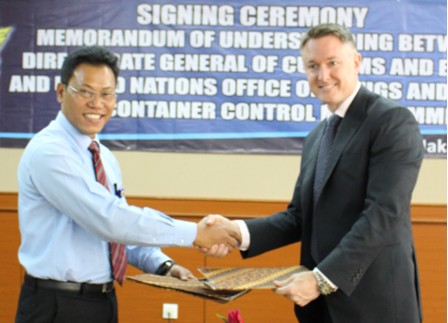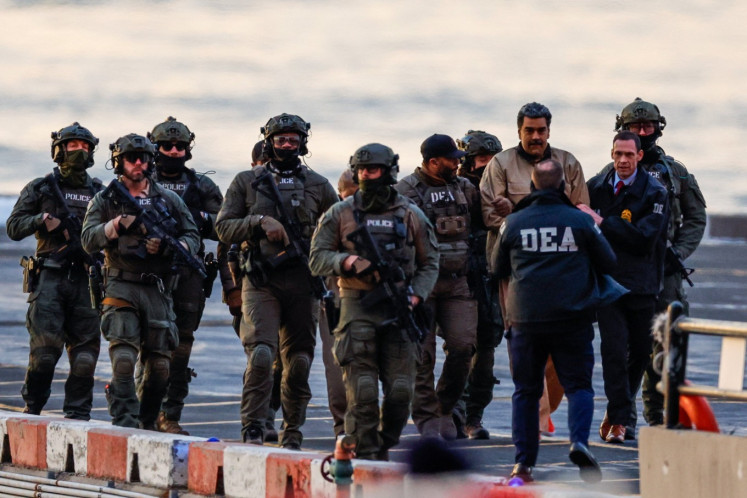Popular Reads
Top Results
Can't find what you're looking for?
View all search resultsPopular Reads
Top Results
Can't find what you're looking for?
View all search resultsIndonesia needs to increase cooperation with China, ASEAN against drugs
Indonesia needs to increase cooperation with China and other neighbors in combating illicit drugs, according to the UN Office on Drugs and Crime (UNODC) Regional Representative for Southeast Asia and the Pacific Jeremy Douglas. He was in Jakarta to attend the UN ASEAN cooperation meeting on March 30-31. The following are excerpts from his interview with The Jakarta Post’s Sepsha D. Restiananingsih.
Change text size
Gift Premium Articles
to Anyone
I
ndonesia needs to increase cooperation with China and other neighbors in combating illicit drugs, according to the UN Office on Drugs and Crime (UNODC) Regional Representative for Southeast Asia and the Pacific Jeremy Douglas. He was in Jakarta to attend the UN ASEAN cooperation meeting on March 30-31. The following are excerpts from his interview with The Jakarta Post’s Sepsha D. Restiananingsih.
You have just attended the UN-ASEAN meeting in Jakarta. Please elaborate on the issues that you raised.
As part of the UN network on transnational crime, terrorism, corruption, money laundering, drug issues, I was there to represent what we are doing […] to help them implement regional commitments in relation to the topic. The ASEAN community is integrating very fast and as a result […] we see changes in transnational crime, we see organized crime […] drug trafficking, different types of transnational forms of trafficking […].
And how the region is to put in place what we call protective measures, for example to secure the ports, the borders […] it is about [placing] protective measures for the countries to stop the movement of terrorists, stop financing of terrorists […].
What we were advising […] as the region integrates more […] is that security integration to some extent should go along with economic integration. So you need […] the proper mechanisms at the borders to protect against transnational, organized crime […].
As you increase trade between countries […] more shipping containers move between countries [… ] there’s more trafficking because illegal goods move with the legal goods. So you need to […] protect the legal trade, against the illegal trade, against the trafficking.
When it started operating in 2012, the UNODC saw Indonesia as a major international drug-trafficking hub. Does Indonesia remain so nowadays?
It remains a major drugs market and we increasingly see some cases of organized crime from other countries not far away trying to ship very large amounts of methamphetamine here -- a highly synthetic drug, or shabu […] .
And that has a huge impact on the youth, clearly this is the destination for shabu. Also regional organized crime have also set up labs to make the drugs […] so we are working with the BNN [National Narcotics Agency] on regional issues […].
Does the UNODC see Indonesia making inroads in combating drug abuse?
Indonesia is working with neighbors and is making efforts to address the trade in drugs or the chemicals […] the problem is so big it requires a lot of creativity and […] a balanced approach, law enforcement, justice, as well as health […] What’s really important is international cooperation […] it has to be expanded.
So Indonesia really needs to work with China and the other ASEAN countries. China is a source of chemicals and synthetic drugs coming here. So there really needs to be strong relations.
Do drugs mostly come from China?
Sometimes, often it is shabu, crystal methamphetamine. Because China has […] precursor chemicals, chemicals to make the drugs. Shabu is 100 percent chemical. […] So they sometimes make the drugs there and then ship the drugs. And this is a market of 250 million people with a lot of young people with more disposable income, so it’s a very good market to make money.
What’s the most widely available drug besides shabu in ASEAN in recent years?
[…] The first drug is methamphetamine, second is heroin. You also have opium […] but more heroin is up in the Golden Triangle [of Myanmar, Laos and Thailand…] we also see cannabis but the biggest problems are methamphetamine and heroin.
Where have the drugs that are widely available in Indonesia mostly come from?
The drug market in Southeast Asia is very diverse. In Indonesia the most popular is methamphetamine [or] crystal form of shabu, similar to the Philippines […].
If you go to Thailand, you see shabu but the more common form is the methamphetamine pill they call yaba [… ]. So in the Mekong area you have methamphetamine, but in pills, here it’s powder.
How many drug users in Indonesia has your office recorded compared to the other countries in the region?
We haven’t done a study. We are proposing in our new country strategy for Indonesia that we do a large drug user survey […].
So for example you need to study the population of drug users to know what type of drugs, how they use them and where [...] there are going to be differences in the country so you can tailor-make your strategy.
For example Thailand has a very high level of use of methamphetamine, the highest level in ASEAN […] you have users going back 20-30 years but recently you have a lot of young people using it. Yaba is much cheaper than shabu.
Why is it so difficult to beat the international syndicates despite UN help?
Well, our help has been very targeted. […] We need a lot more resources than we have. The other thing that we really need that makes it particularly challenging in this region is […] methamphetamine can be made anywhere. You can make methamphetamine in Bali, Yogyakarta, Jakarta […]. In Aceh you just set up the factory […]. A lab […] can be a table, inside a room […].
In any other country they hide the lab, sometimes in neighborhoods, in jungles. […] With heroin they make it from a plant, opium, we know where the producers are, in the mountains. There are opium fields; you don't see methamphetamine.
So you have to be able to infiltrate the organized crime, to understand the organized crime and then you can have programs to stop them. And that means you need intelligence and you need to share information between countries because the organized crime groups are working in many countries at one time […].
So, our recommendation to governments like Indonesia is to really increase your international cooperation, your intelligence sharing and increase your efforts to target trafficking organizations. Our recommendation is not to target the drug users and the small sellers. It’s to target the “big fish” […].
What kind of international cooperation should be increased?
Right now there is cooperation but it tends to be case by case.
The government of Cambodia or Thailand might get the information [on a] would-be trafficker who would take drugs to Indonesia or to Malaysia. So they would share this information and catch the person at the airport […]. It is not systematic cooperation.
So there needs to be better intelligence collection and better intelligence sharing across the region. So, the police in Indonesia need to be much better connected […].
---------------
We are looking for information, opinions, and in-depth analysis from experts or scholars in a variety of fields. We choose articles based on facts or opinions about general news, as well as quality analysis and commentary about Indonesia or international events. Send your piece to community@jakpost.com.










